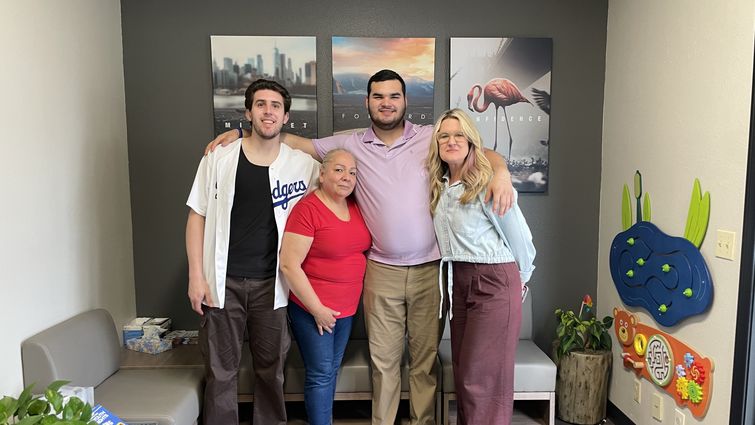
In the coming year, Aaron Almendarez aims to enroll in trade school to acquire the specialized skills necessary for a career in underwater welding. This goal is a recent development because Almendarez had previously believed that pursuing such education was beyond his reach. Despite envisioning a promising future, Almendarez continues to grapple with the lingering effects of a troubled past marked by childhood abuse.
During high school, he experienced homelessness, navigated challenging dynamics with his family, and battled health issues such as Non-Hodgkin's lymphoma. Throughout this period, his belongings were always packed in three duffle bags and a backpack as he relocated from one place to another. "I was always watching behind my back, and I didn't know where to go," said Almendarez.
He struggled with this until he managed to get a cell phone and contact Margie Gomez, his godmother, who now holds full custody of him.
During much of Almendarez's early years, Gomez would pick him up from his mother's home, and they would spend weekends together. However, everything changed when Almendarez's mother was incarcerated, and his older brother obtained full custody of Almendarez. Gomez was then instructed not to take Almendarez anymore, according to Gomez.
"I didn't want any trouble with the police or for him to get in trouble, so I just said, 'he's going to look for me. It's going to be okay. I know he’s going to find me,” said Gomez.
Since reuniting with Gomez, she took it upon herself to find medical and mental health support for Almendarez.
"I knocked on a lot of doors, and finally one opened, and it had everything he needed," said Gomez.
Loma Linda University Children's Resiliency Institute for Childhood Adversity (RICA) provides a safe space for victims of child abuse to share their stories once while receiving seamless health services. The center is a collaboration of numerous local agencies to provide forensic interviews and medical examinations to evaluate child abuse allegations. It offers personalized pediatric treatment based on the child's needs, including therapy, developmental and nutritional assessments, dental evaluations, hearing and vision screenings, vaccinations, and long-term pediatric routine care.
"One of the devastating things about child abuse is that often children aren't believed. The first step is just having someone who hears you, believes you, and takes action based on that," said Amy Young, MD, chief of the division of forensic pediatrics at Loma Linda University Children's Hospital.
RICA provides outpatient services for more than 2,000 children annually who have experienced physical or sexual abuse. Additionally, it handles around 300 to 400 inpatient cases each year.
“RICA means the whole universe to me," said Almendarez. "If I never found RICA, I would be in the middle of the street, in a gang, or running around with people I shouldn't."
In addition to medical and mental health support, RICA aims to be a consistent, nurturing presence in its patients' lives. The team doesn't just support patients in their moment of crisis but is invested in their future by providing scholarships and job opportunities.
"I can hardly recall when a patient needed something, and we couldn't find a solution,” said Amy Young- “It's quite unusual. We don't just give out phone numbers and tell them to seek help elsewhere. We've gone as far as helping young adults find cars and secure affordable housing.”
Children are the most vulnerable members of our society, relying on adults for care, protection, and guidance. However, statistics reveal a sobering reality: more than 600,000 children are abused in the U.S. each year, according to the National Children's Alliance. This figure is likely an underestimate because many cases are unreported. Child abuse takes many forms, including physical, sexual, emotional, and neglect. They inflict lasting scars on a child's physical and psychological well-being, affecting their development, health, and future opportunities.
If you witness or suspect a crime, contact the law enforcement jurisdiction responsible for that area. Additionally, if the child involved resides in San Bernardino County, please contact Child Welfare Child Protective Services for that county. This means that if you believe the crime occurred in Riverside County, but the child lives in San Bernardino County, you'll need to report to two different entities.
The child abuse hotline is accessible by dialing 211. By stating that you want to report a suspected case of child abuse, your call will be directed to child welfare or child protective services.
